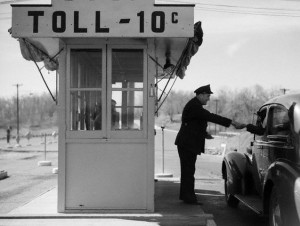Huffington Post today contained a timely article on the privatization of highways and their tolling, Toll Road Privatization: As Ohio Considers It, Indiana Serves As Cautionary Tale.
The article discusses that state’s across the country are looking at privatizing highways as a way to finance necessary infrastructure repairs. One interesting tolling concept discussed would privatize Interstate 95 and the Capital Beltway around my hometown, Washington, DC. Partnering with private investors using an 80-year lease, the plan would develop a ‘HOT’ (high occupancy toll) lanes. Here’s way the plan would work – if you are a commuter with 3 people in a car you won’t have to pay a toll but if you are commuting with 2 people, you would pay a toll to ride in the fast lane. This plan would guarantee revenue for the length of the lease. A HOV lane typically requires 2 persons in the car but in this instance, a HOT lane rewards those commuters with 3 or more persons — no toll.
Jeremy Roebuck of MontCo Memo, a blogger writing on Montgomery County politics and communities writes an interesting post today on the Montgomery County politics of the tolling of 422. Looks like there are some Montgomery County politicians who believe to support 422 tolling could be their poison pill in November. Here’s Roebuck’s post:
MontCo Memo, www.philly.com – posted by Jeremy Roebuck
For whom 422 tolls?
Well, that didn’t take long…
A week ago Montgomery County’s commissioner candidates adopted a mostly wait-and-see attitude regarding the Delaware Valley Regional Planning Commission’s plan to toll 422 to fund much-needed, congestion-easing improvements. This week, all four have come out against the plan.
Incumbent Commissioner Bruce L. Castor Jr. and his Republican ticket running mate Jenny Brown, a Lower Merion Commissioner, released a statement Wednesday declaring their opposition. Said Brown: “The taxpayers have already paid for route 422, and tolling in this circumstance is not appropriate.”
Brown has a history of being a fiscally conservative hawk on Lower Merion’s board of supervisors, so no surprises there. Castor, who said last week he wasn’t crazy about the idea but needed more information, joined Brown in full-throated condemnation Wednesday.
Not to be outdone, Democratic candidates State Rep. Josh Shapiro and Whitemarsh Supervisor Leslie Richards released a joint-statement of their own, also poo-pooing the prospects of tolls: “We are committed to reducing congestion on our roadways–particularly along the Rt. 422 corridor. While we are in search of workable solutions to address our infrastructure needs, we are opposed to the Rt. 422 tolling plan.” Last week, Richards said she looked forward to seeing what the DVRPC was going to propose.
It was always going to be a tough sell. To pass, the DVRPC’s plan needs approval first from the state assembly — which must approve legislation allowing locally run tolling authorities in the state. Then, county commissioners had to come together in Montgomery, Chester and Berks Counties to create such an authority here.
And while many state and local politicos agree in private that the tolling proposal is the only way 422’s congestion will be eased any time soon, it’s become political poison among the area’s cash-strapped commuters.
Don’t think for a second those political factors haven’t weighed on the minds of the DVRPC’s planners. Unveiling the plan during a county election year is a gamble as it is sure to become an issue in commissioners’ campaigns in the three counties. But putting it off another year, would drop the question right in the middle of State Assembly races. (State Rep. Warren Kampf, R., Chester, has already shown the power of taking a strong anti-toll stance. He unseated incumbent Paul Drucker in part on a platform opposed to tolling.)
Still, Joseph M. Hoeffel III — vice chair of MontCo’s commissioners’ board, head of the DVRPC, and one of the tolling plan’s chief proponents — thinks there’s still room to navigate these tricky political waters.
Then again, he’s not running for re-election.
